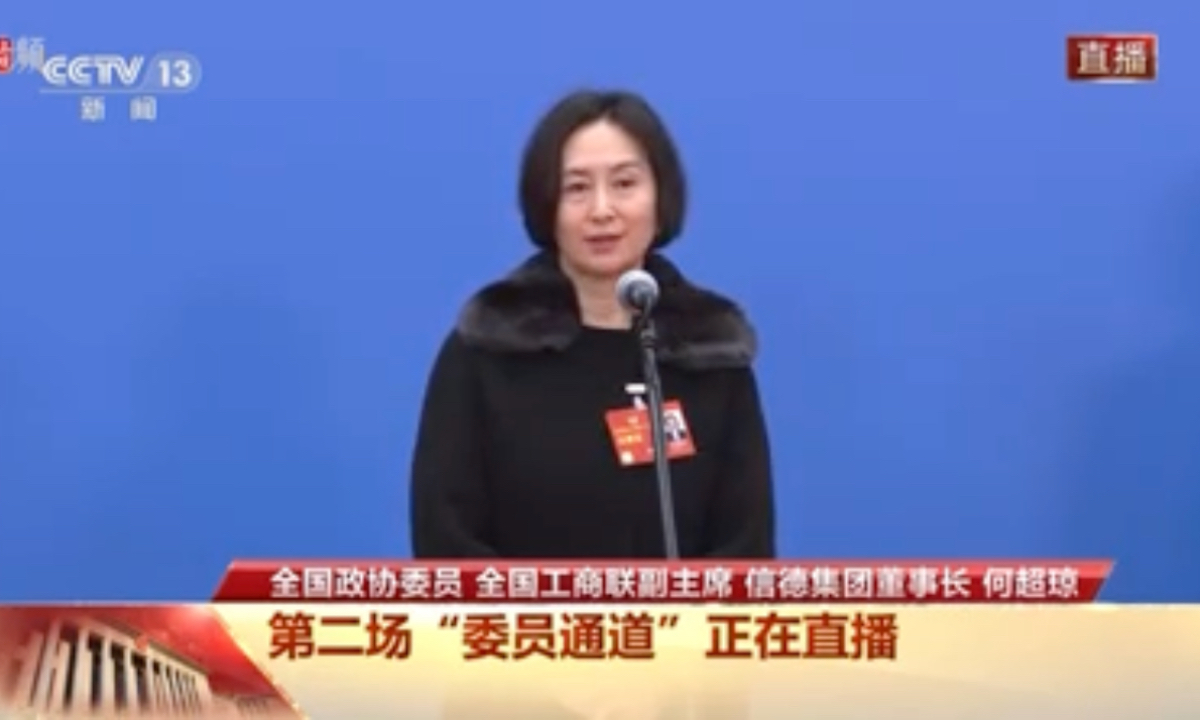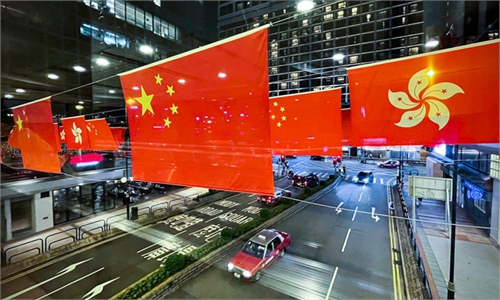Every resident in Hong Kong, Macao to be participant, practitioner and beneficiary of national security education: policy advisor

Pansy Ho Chiu-king, a member of the National Committee of the Chinese People’s Political Consultative Conference (CPPCC) from HKSAR. Photo: CCTV
The Chinese mainland should organize lecture groups to help popularize the National Security Law (NSL) for Hong Kong and also education about history and culture, and allow a certain number of college students from Hong Kong to have internships in state-owned enterprises, centrally administrated enterprises and public institutions for at least a month every year, said a member of the 14th National Committee of the Chinese People’s Political Consultative Conference (CPPCC).
Pansy Ho Chiu-king, a CPPCC member from the Hong Kong Special Administrative Region (HKSAR), told the Global Times on Thursday that outstanding students can stay in the mainland to become employees of those enterprises, which will help strengthen their awareness of the One Country, Two Systems principle, helping popularization of the NSL for Hong Kong.
“Every resident of Hong Kong and Macao should be a participant, practitioner and beneficiary of the national security education, rather than a bystander,” Ho said.
Wang Chao, spokesperson for the first session of the 14th National People’s Congress (NPC), told a press conference on Saturday that the formulation and implementation of the NSL for Hong Kong is an important milestone in the development of the One Country, Two Systems principle, which helped bring the city back to the correct tract and ensure the rights and freedom of local residents. An online poll showed that 75.7 percent of Hong Kong residents feel satisfied with the implementation of the law, Wang said.
However, some young people in Hong Kong universities may be influenced by internal and external forces that attempt to oppose the mainland and disrupt Hong Kong, said Ho. This means, “we need to pay special attention to guiding them, and correcting them if necessary.”
Young people are eager to express themselves and many have biased views that are contradicted by the facts. They must be influenced from the classroom to community to social media to daily life, Ho said.
“We need to kindle their hope for the future with all-out efforts, boosting their patriotic sentiment and enhancing their awareness about the nation,” she said.
The mainland can regularly organize lecture groups to Hong Kong and Macao to assist in the popularization of the NSL for Hong Kong, and the groups could include staff members of administrative institutions in the mainland, teachers and students from mainland universities and representatives of high-end firms, Ho said. “Such face-to-face communication will help the public, especially the young people, relax their guard and prejudice, get rid of historical nihilism, re-establish positive values, and enhance their sense of responsibility to the country, the nation and society.”
As for college students and graduates, Ho said that the SARs and relevant departments in the mainland could recruit a certain number of graduates to state-owned enterprises, central enterprises and institutions in the mainland at least a month.
Excellent interns from Hong Kong and Macao could then apply to become employees, which can also solve the employment and development problems of youth in Hong Kong to a certain extent, Ho said.
During an interview at the ongoing two sessions, Ho said that Hong Kong should act as a “super contact” for the Guangdong-Hong Kong-Macao Greater Bay Area and the world, and take advantage of its development potential to empower the nation’s construction.
“Some people say I am from Macao, some people say I am from Hong Kong, I will say I am from the Greater Bay Area,” Ho said, which also drew warm applause from the mainland audience.
According to Ho, there are nine cities and two SARs in the Greater Bay Area where people drink water from the same river, share the same culture and history of thousands of years, eat the same food, and have the same character of bearing hardships and standing for hard work.
The development plan of the Greater Bay Area adopted in 2019 has provided a clear guidance on the advantageous development of the 11 cities, especially in terms of collaboration, Ho said, adding that the area should make good use of government’s supporting policies to complement each other’s advantages.
As a matter of fact, the total population of the Greater Bay Area had surpassed 86 million as of 2020 and its economic aggregate climbed to 12.6 trillion yuan in 2021, which reflects the huge market, rich human resources and unlimited development potential, Ho said.
According to Ho, Hong Kong has entered a new stage of governance and prosperity and the Greater Bay Area will become a great stage for Hong Kong’s development. As a highly open and internationalized city in the Greater Bay Area, Hong Kong is an international financial, shipping, trade center and aviation hub with its high-quality professional services reputed in the world.
Relying on the unique domestic advantages, Hong Kong should act as a “super contact” between the Greater Bay Area and the world, and take advantage of its development opportunity to empower the construction of the country, Ho said.
Ho recalled her first job related to the cooperation between Guangdong, Hong Kong and Macao 25 years ago when Hong Kong had only recently returned to the motherland and the mainland was carrying out its historic reform and opening-up policy while the Pearl River Delta was showing its great potential for development.
“I thought Hong Kong could not keep to itself and sought to expand cross-border shipping business in 1999, introducing cooperation with state-owned companies, coordinating and expanding the development of maritime transport networks and carrying forward Hong Kong’s unique strengths,” Ho said, noting that nowadays the completion of the Hong Kong-Zhuhai-Macao Bridge has furthered connected the three cities.
“I feel extremely proud and honored to have acted as a witness, promoter and participant in this process,” Ho said.
According to Ho, as long as Hong Kong, Macao and the nine cities in the Greater Bay Area have a consistent goal, concerted effort and mutual consensus, they can make the whole bigger and stronger by making good use of the advantages conferred by the country.
Ho said she believes that the Greater Bay Area can play a very good example for the achievement of Chinese-style modernization and the realization of the Chinese Dream with hands joined together, as well as making a positive contribution to building a community with a shared future for mankind.

